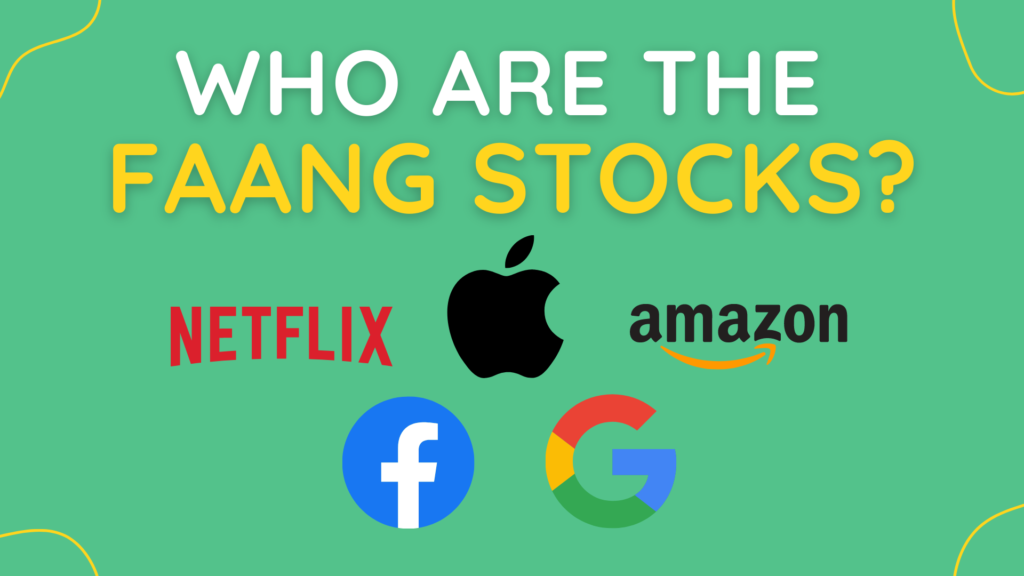
Sammie Ellard-King
I’m Sammie, a money expert and business owner passionate about helping you take control of your wallet. My mission with Up the Gains is to create a safe space to help improve your finances, cut your costs and make you feel good while doing it.

Quickfire Roundup:
The FAANGs are the five big tech stocks that analysts thought were the big boys.
Faang stands for Facebook, Apple, Amazon, Netflix and Google.
But, how did this name come about and why is Microsoft not in Faang? Read on to find out.
Back in 2013, continuing on until perhaps very recently, this basket of stocks was seen by analysts as the main driver behind the tech sector of the entire stock market.
For those looking to invest in FAANG stocks this article is going to unpack what faang stands for, why certain stocks aren’t in it and the history behind the name.
Why is it called FAANG?
If a FAANG stock released a solid earnings report, it could take the entire market up with it, and vice versa, bad news relating to one of these companies could spark a short term selloff.
Simply put, they were the most important stocks on the exchange.
Is the FAANG still relevant right now?
The market has changed significantly since 2013, and especially in the past two years as so much disruption has occurred due to the pandemic, and just as importantly, changing again as the pandemic winds down.
Retail investors still have many of these stocks in their portfolios as they have been the leaders of the latest bull run.
The performance of FAANG vs SP500 since 2013 has been quite staggering, but personally, I don’t see some of the stocks within FAANG being market leaders for much longer.
That being said with dividend stocks being the current craze, I suppose the question is will they hold onto them and are they still popular?
Facebook parent company Meta is still clearly one of the most important tech stocks in the world and is poised for more massive growth as the Metaverse rolls out during the next decade. It has not been all smooth sailing for Mark Zuckerberg’s company though.
Apple changed the privacy settings in their mobile operating system a couple of years ago which resulted in Facebook being much less effective at pinpoint targeting their ads.
The result was that businesses were less willing to pay a premium for Facebook ad services which led to a huge decrease in Meta’s earnings.
Furthermore, fair or not, Zuck and his company tend to take a hit whenever American politicians need a scapegoat and reflexively line up Big Tech in their crosshairs.
To be sure, Facebook has made some glaring ethical mistakes in the past, but this risk, known as Headline Risk, definitely can weigh on Meta stock whenever the company finds itself in the headlines of major newspapers.
Regardless of the recent Apple iOS changes, this company still proved some of the best bang for the buck for small and medium sized business advertising.
But, more importantly, as their recent name change implies, the trillions of dollars that will be made in the Metaverse during the next decade is theirs to lose.
This company still represents major value and has a place in your portfolio if you have a multi year time horizon.
Apple
Apple, one of the largest companies in the world, is clearly the market leader in mobile phones and their name is synonymous with quality.
The iPhone is the most profitable mobile device in the world, and second place Samsung is far behind. Clearly they are head and shoulders above their competition.
There are two other areas in Apple’s business model that set them apart from other tech companies. They make enormous amounts of profit not from their high ticket products, but from the App Store and cloud services.
One can make the case that they are a consumer goods company as much as a tech company and deserve to trade at a higher price to earnings multiple than a straight tech company like the other mobile phone makers.
What’s more, the worst kept secret in Silicon Valley is that Apple is working on building an automobile.
While much of the details of the car are unknown, and reports are that it is unlikely to be a direct competitor to the traditional automakers and even Tesla, Apple has a very long and well established history of knocking it out of the park with new products.
Betting against them has proven to be a mistake. Apple is still a fantastic company for the long term.
Learn more about how to invest in Apple.
Amazon
Amazon is the only company in FAANG that does not call Silicon Valley home. While everyone is familiar with Amazon and knows it is a colossal company with massive reach into many markets, many still think of it as just an ecommerce company.
Founder and newly retired CEO Jeff Bezos started the company in the early days of the Internet as simply a book retailer.
He thought, correctly, books were something that would sell easily on the new invention as book consumers would not need to physically see and feel the products they were buying compared to things like clothes or other physical items.
If you are under forty years old, that may sound silly, but in the early days of the Internet there was a lot of scepticism about online shopping.
Bezos has proven to be a visionary time and time again, and today Amazon’s main profit comes from its cloud and data arm Amazon Web Services (AWS).
Many small and large companies are reliant on AWS for their daily operations and Amazon has proven to be one of the most innovative and efficient companies in the world for years on end.
Amazon was perfectly positioned to grow during the pandemic as consumers switched to doing almost everything online.
While many of those gains have been lost as the pandemic has subsided and the stock market has corrected, Amazon is still a leader and is relevant even if it has fallen out of favour as of 2022, it is still worthy of being in your portfolio if you have a long term outlook.

Netflix
Netflix is the one company in FAANG that is no longer a market leader or a major player in the day to day movement of the stock market. Netflix started as a DVD rental business over twenty years ago.
It was one of the first companies to offer streaming services for movies and other video content.
For years it was a clear market leader and during the pandemic saw astonishing growth as people had to eschew movie theatres and other forms of entertainment for staying home.
Netflix not only provides a platform for movies, but creates some of the most popular content in pop culture. They produce shows and movies in many genres, languages and for all age groups.
Their stock soared and soared for years, but came crashing down in early 2022, losing as much as 75% of its value in a few weeks due to shrinking subscriber growth.
Facing competition in streaming from the likes of Disney, Apple, traditional TV networks and others, coupled with more entertainment options post pandemic, the outlook for Netflix is not good.
Why is Netflix in FAANG?
They may not be a bad investment, and they have announced that they will be taking steps to increase their revenue such as cracking down on password sharing and the addition of some advertising revenue, the chances of them returning to market leading status are slim to none.
Going forward they will be nothing more than just another tech company, in the same vein as other former high flyers such as Cisco, Intel and Dell.
Learn more about how to invest in Netflix.
That brings us to Google, or Alphabet as they are known today. Everyone is familiar with Alphabet’s products such as Google Search, Ads, Gmail, and the ubiquitous YouTube, among many others.
What you may not realise is the size and scope of what Alphabet does.
They are much more than the search and email provider that you likely use on a daily basis. A transcript of one of their earnings calls reads like a science fiction short story.
What they are doing in the fields of Artificial Intelligence and data science is truly staggering. Human Genomics, pharmaceutical sciences, robotics and autonomous driving are just a small sampling of the things they are working on.
Even at its trillion dollar market cap, they represent tremendous value and going forward and Alphabet will be a leader in tech and the stock market as a whole.
It is hard to make a case why anyone should not own this stock in their portfolio.
Is FAANG dead?
In a word, it is safe to say that yes, FAANG is dead. Technically it’s actually not MAANG with Facebooks name change.
Not only because clearly Netflix is no longer as relevant as it once was, but there are other large cap tech companies that will be the large driving forces behind major moves in the stock market as we progress further into the 21st century.
The Metaverse, or Omniverse as some call it, is the future of the Internet and while no one knows exactly what it will be, it will combine virtual worlds with our day to day lives in new, exciting, and sometimes scary ways.
Artificial Intelligence is another field that will be a major force both in our lives and the stock market. Just look at the hype of chat GTP and open AI.
So if FAANG is dead, what’s next and should you invest?
What is FAANG called now?
A lot of people ask why Microsoft isn’t in FAANG, and Netflix is. It’s a valid question, but one could say that Microsoft wasn’t as sexy at the time.
One replacement or FAANG alternative is MAMAA, which includes Meta, Apple, Amazon, Alphabet and Microsoft to replace Netflix.
Why Isn't Microsoft In Faang?
Microsoft is a trillion-dollar company that has stayed innovative and relevant since the early days of the Internet. Without a doubt, they are market leaders who belong in any conversation about the future of tech and the day-to-day movements of the stock market.
Learn more about how to invest in Microsoft.
Two other companies deserve a place in the conversation, those being Tesla and Nvidia. Elon Musk’s company is one of the largest companies by market capitalisation and Nvidia is right behind them. It is important to note that Tesla is not just a car company.
Learn more about how to invest in Tesla.
They are leaders in solar and batteries, which will both see huge growth and we wean ourselves off fossil fuels in the coming years, and most importantly, they are a data company working on perfecting autonomous driving.
The amount of money Tesla spends on research and development is truly staggering. They are building the world’s first truly autonomously driving car, and while success is not guaranteed, it is hard to bet against Elon Musk.
Nvidia is a silicon chip designer led by founder and CEO Jensen Huang that is poised to be the leader in the chips that power A.I. and the Metaverse, or Omniverse as Huang calls it.
Nvidia’s chips will be at the forefront of whatever new technology we see and they deserve to be in the conversation of the large cap tech stocks that drive the market.
How To Invest In Faang Stocks?
Investing in FAANG stocks – the powerhouse quintet of Facebook (now Meta), Amazon, Apple, Netflix, and Google (Alphabet) – means diving into the dynamic world of tech giants known for their innovation and market dominance.
To get started, open a brokerage account, conduct thorough research to understand each company’s financial health and growth potential, and consider diversification to mitigate risk.
While these stocks promise potential high returns, they also come with volatility, making it crucial to align your investment with your risk tolerance and long-term financial goals.
Learn more about the Best Investing Apps 2024.
Conclusion
MAMATAN isn’t as euphonious as its predecessor FAANG, but these seven companies should be considered by any investor who wants to invest in tech, and perhaps more importantly, staying aware of what each of these companies is doing.
Whether you invest or not, it’s wise for anyone following the stock market to keep an eye on the faangs.
The FAANGs may have had their day, but with their size, I wouldn’t underestimate them in any way!
Share on social media
Disclaimer: Content on this page is for informational purposes and does not constitute financial advice. Always do your own research before making a financially related decision.


